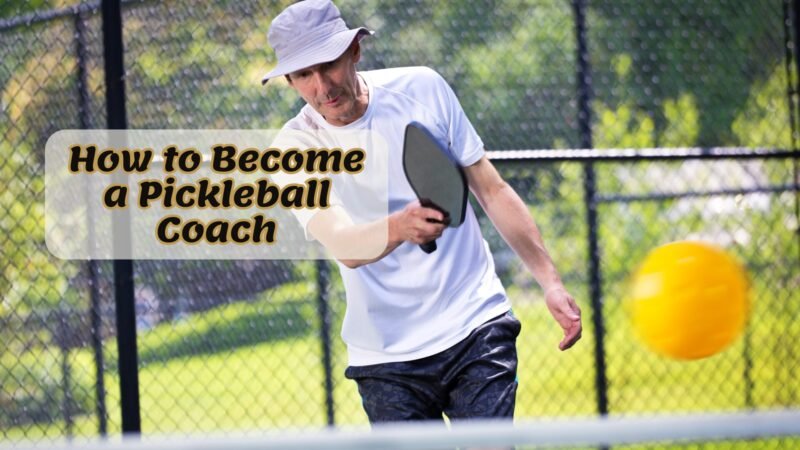Skilled pickleball coaches are in high demand. If you’re wondering how to become a pickleball coach? Don’t overthink it because Our beginner’s guide is here to help you turn that dream into reality.
This guide will walk you through the steps to develop your coaching skills and make a meaningful impact on the court with a certified pickleball coach tag. Let’s talk about how you can be a pickleball coach.
Steps to Become a Pickleball Coach
- Learn the rules, and understand game strategies.
- Analyze professional matches for techniques and strategies.
- Engage with local clubs and online forums for insights and continuous play.
- Volunteer with experienced coaches and offer free lessons to gain practical teaching experience.
- Research organizations like PPR, PCI, IPTPA, and USPTA for pickleball certification programs.
- Enroll in pickleball certification workshops, available both online and in person.
- Build an online presence, and network, and use platforms like Jobs in Sports to find coaching opportunities.
This was a quick overview of the process that you can implement to become a certified pickleball trainer. We have shared 5 practical steps below with in-depth explanations, by following those steps you can be a pickleball instructor and will find pickleball coaching opportunities.
Is it Worth it to become a Certified Pickleball Instructor?
Why certified? You might be thinking, because certification matters in pickleball coaching. These certifications build trust and credibility and most people prefer investing in a certified pickleball coaching system when they start learning pickleball from a trainer.
Becoming a certified pickleball teacher is beneficial for several reasons:
- Credibility: Certification shows you meet specific skill and knowledge standards.
- Income: Certified instructors often earn more for their lessons.
- Resources: Access to teaching materials and the latest game rules.
- Networking: Connects you with the pickleball community and professionals.
- Career Growth: Opens doors to advanced coaching roles and opportunities.
- Trust: Students are more likely to trust a certified instructor’s expertise.
- Personal Development: Enhances your playing skills and teaching methodologies.
- Sport Contribution: Helps professionalize and standardize pickleball instruction.
5 Important Steps to Become a Pickleball Instructor
For becoming a valuable and respected pickleball instructor, we have shared factual and practical steps that will help you to be an international pickleball trainer.
Step 1. Dive Deep into the Gaming Experience
This is the most important step for becoming a pickleball coach because when you learn and experiment with different skills and gain knowledge about the basics to advance, your pickleball teaching process will be more effective and meaningful.
Play Regularly to Improve Pickleball Skills
- Consistent play enhances your skills and understanding of the game. Regular practice sessions significantly improve your gameplay, whether alone or with partners.
Learn from Professional Matches
- Observing professional pickleball matches offers insights into strategic play, positioning, and shot selection. Analyzing these elements can elevate your own game.
Join a Pickleball Club or Community
- Connecting with a local pickleball club or community provides opportunities for regular play, learning from more experienced players, and participating in local tournaments.
Utilize Online Resources: Tutorials, Forums, and Articles
- The internet is a treasure trove of pickleball resources. From instructional videos and strategy articles to online forums, there’s a wealth of information available to deepen your understanding of the game.
Get Feedback from Experienced Players
- Feedback from seasoned players can offer valuable insights into your playing style, strategy, and areas for improvement. Constructive criticism is key to advancing your skills.
Step 2. Gain Practical Experience
Gaining practical experience is a crucial step on the path to becoming a certified pickleball coach. Start by diving into local leagues and tournaments. It’s about observing the game’s dynamics, understanding different playing styles, and learning how to manage games and players under competitive conditions. It’s where theory meets practice.
Next, consider volunteering or assisting established pickleball instructors. This hands-on approach allows you to learn from seasoned professional trainers. You’ll pick up on the nuances of coaching, from planning sessions to delivering feedback effectively.
It’s a chance to see different pickleball coaching styles in action, also you can understand the pickleball lessons cost that professional pickleball coaches are charging and understand the behind-the-scenes work that goes into creating successful players and teams.
Furthermore, offering free pickleball lessons can be incredibly beneficial. It’s a win-win: you gain valuable teaching experience while helping others improve their game. This step is about building your confidence as an instructor and honing your ability to communicate and adapt your teaching methods to different learners. Through these free sessions, you’ll also learn to identify common challenges players face and develop strategies to help them overcome these hurdles.
Step 3. Pursue Pickleball Certification
Pursuing certification as a pickleball instructor involves understanding the landscape of certifying bodies, such as the Professional Pickleball Registry (PPR), Pickleball Coaching International (PCI), International Pickleball Teaching Professional Association (IPTPA), and the United States Professional Tennis Association (USPTA).
Each organization offers unique benefits, with some focusing more on pickleball-specific skills and others on broader racquet sports instruction. The certification process typically includes attending workshops, passing written exams, and completing practical assessments, ensuring instructors are well-prepared to teach.
When deciding on the right certification body, consider your teaching goals and the specific needs of your potential students.
Some bodies may offer more prestige or specialized knowledge in certain areas of the game. Additionally, weigh the pros and cons of online versus in-person certification options.
Online courses offer flexibility and convenience, ideal for those with tight schedules or limited access to in-person sessions. In contrast, in-person workshops provide hands-on experience and direct feedback, which can be invaluable for developing effective teaching techniques.
Step 4. Stay Up to Date
A pickleball instructor must stay updated. The sport is dynamic, with frequent updates to its rules and playing styles. Keeping abreast of these changes ensures your pickleball teaching methods remain relevant and effective.
For instance, understanding the nuances of new serving rules or the strategic implications of rule adjustments can significantly impact how you coach your students.
Equipment in pickleball also evolves, with advancements in paddle technology and ball design affecting gameplay.
Being knowledgeable about the latest equipment can help you advise students on the best choices for their playing style and level, enhancing their performance and enjoyment of the game.
Engagement with the pickleball community is another key aspect of continuous learning. Participating in forums, attending conferences, and networking with other Pickleball coaches can provide insights into innovative coaching techniques and trends in the sport.
This community engagement not only enriches your knowledge but also keeps your passion for the game alive, inspiring both you and your students to grow and improve.
Step 6. Marketing Yourself as a Pickleball Coach
Marketing yourself as a pickleball coach is essential for building your client base and enhancing your reputation in the sport. Here’s how you can effectively market yourself:
Develop a Strong Online Presence
Create a professional website showcasing your coaching philosophy, services, and success stories. Utilize social media platforms to share tips, highlight student progress, and engage with the pickleball community. Regularly updating your content can keep you visible and attractive to potential students.
Networking and Building Relationships
Attend pickleball events, tournaments, and workshops to connect with players and other coaches. Joining local pickleball clubs and online forums can also expand your network. These connections can lead to new opportunities and increase your visibility within the community.
Referral Programs
Encourage your current students to refer others by offering incentives, such as discounted lessons for every new student they bring. Word-of-mouth is a powerful tool in the sports coaching world, and satisfied students are often happy to recommend a coach they trust.
Run Promotions
Offering promotions, such as a free initial coaching session or discounted packages for new students, can attract people to try out your services. Seasonal or event-related promotions tied to local pickleball tournaments or holidays can also generate interest.
Conclusion
Becoming a certified pickleball coach offers a rewarding pathway to share your passion for the game, enhance your professional credibility, and connect with a growing community. By immersing yourself in the sport, gaining practical experience, pursuing certification, staying updated on the latest developments, and effectively marketing your skills, you can build a successful pickleball coaching career and find coaching opportunities because of the growing popularity of pickleball.
FAQ’s
Is it necessary to be a certified pickleball coach?
Becoming a certified pickleball coach isn’t strictly necessary but highly recommended. Certification provides credibility, enhances your teaching skills, and increases trust among students. It signifies a professional commitment to the sport, offering a competitive edge in the growing pickleball community. Certification also opens doors to more job opportunities and higher earning potential.
What are the benefits of becoming a pickleball instructor?
As a pickleball instructor, you enjoy numerous benefits: sharing your passion for the game, contributing to the sport’s growth, and connecting with a diverse community. It’s a rewarding career that keeps you physically active and mentally engaged. Certification can elevate your status, allowing for higher income and access to exclusive teaching resources and networks.
Is pickleball coaching a good career?
Yes, pickleball coaching is a promising career. With the sport’s booming popularity, demand for qualified coaches is on the rise. It offers flexibility in work hours, the joy of teaching a sport you love, and the opportunity to make a positive impact on others’ lives. Whether part-time or full-time, pickleball coaching can be both financially and personally rewarding.
How many students can I teach at a time as a pickleball instructor?
The number of students you can teach at once depends on the class type and your comfort level. For individual lessons, one-on-one coaching is standard. Group sessions typically range from 4 to 12 students, allowing for personalized attention while managing the group effectively. Larger clinics might accommodate more, but maintaining quality instruction becomes challenging.
How much can I earn as a Pickleball coach?
Earnings as a pickleball coach vary based on location, experience, and whether you’re certified. Part-time coaches can make $20-$50 per hour, while full-time professionals might earn $30,000 to $80,000 annually. High-demand areas and specialized clinics or private lessons can significantly increase earning potential. Building a strong reputation and client base is key to maximizing income.







